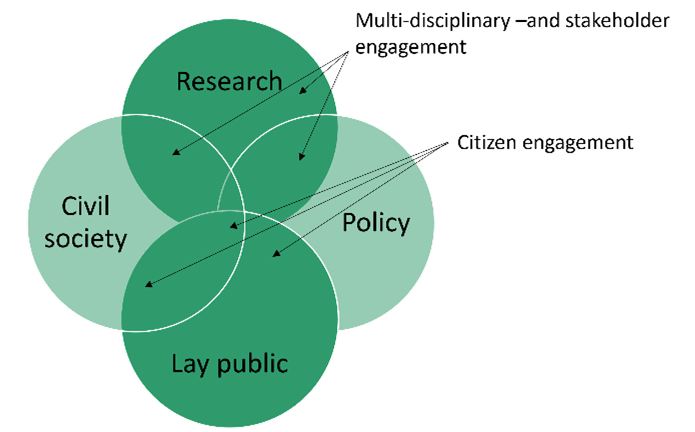Written by Lise Bitsch, senior project manager at the Danish Board of Technology Foundation
In Denmark, 20-25 percent of the population qualify as digitally challenged[1]. So, while Denmark is widely hailed as one of the most successfully digitalised countries in the world, up to one in four lack access to digital tools, the knowledge and experience to navigate digitally, and/or simply prefer an analogue life. The digitally challenged are not only your usual suspects i.e., groups of elderly or people living with different kinds of impairments. No, the group includes young, middle-aged people and well-educated individuals. In addition, digitalisation introduce and re-enforce vulnerabilities in girls, teenagers, and young adults in general, children, lower-educated groups, people with disabilities – and challenges democratic principles of equal access to services of the Welfare state and equal treatment in the justice system. Furthermore, new opportunities for quantifying and tracking the everyday life of populations, groups, and individuals, introduce new opportunities of surveillance, profiling, and introduce challenges to privacy and non-discrimination on many fronts.
As a new mother, is has personally been especially haunting to discover the carelessness with which children are left basically unprotected in digital spaces, and their rights ignored. How their parents, in many cases, are helpless in trying to figure out all the online fora in which their children are supposed to participate, and/or are more or less pressured into participating in.
I do not deny, digitalisation has many virtues. I greatly enjoy the ability to connect with people, news, and events online. The no longer existing need, to make physical appointments everywhere for anything, and online shopping. However, the breath and seriousness of the challenges we face, make it clear that we cannot leave it up to big tech companies and market forces to develop digital infrastructures and solutions that are inclusive, preserve individual rights and democratic principles and functioning of our societies.
And while national governments and international government organisations can do much in terms of regulation and control – we need more. We need to develop a better understanding of how digital solutions play into social dynamics, human psychology, cultural practices, existing norms, and the great diversity of use and diversity of needs between groups in our societies. We need a better recognition of cross-cultural and diversity vectors that influence individuals to different degrees, and how they manifest and affect rights and opportunities in everyday use.
Public engagement holds one of the keys to a better digital future for everyone. In its essence, public engagement is about involving diverse groups in conversation with each other, with the aim of achieving better understanding of each other, and in searching for common ground on which to build solutions to complex problems.
At the Danish Board of Technology Foundation, we have built on the ideals of deliberative democracy in developing methods for local to global public engagement and policy action[2]. Among other projects, we have helped the European Commission and Council of Europe design and carry out the Conference on the Future of Europe (CoFoE)[3], built and coordinated the World Wide Views series[4] providing citizen input for several Conference of the Parties to the United Nations Framework Convention on Climate Change (COPs), and we have supported municipalities and national government in involving citizens locally and nationally.
In terms of who to engage, a crude separation can be made between scientific or technical experts, other types of experts and stakeholders and the lay public. One way of thinking about the different possibilities is through four spheres of societal organisation “Research”, “Policy”, “Civil society” and “Lay public”. Public engagement is then developing productive interactions between representatives of those areas of social activity.

Figure 1 – the breath of interactions possible as art of public engagement activities (source, Lise Bitsch)
The key point being that many issues we face as a society are complex, and each actor within these spheres can bring needed knowledge and experience to the table in better understanding issues and developing solutions. Effects of inclusive and collaborative processes, with delegation of decision-making power include increased ownership and commitment in involved participants. Such effects are crucial in ensuring a digital future that is attractive, desirable, and accepted by everyone.
Since digitalisation affects everyone, democratic societies have an obligation to ensure that all citizens are heard, and preferably involved in decision-making about how our digital futures should be shaped. Likewise, citizens have a duty to participate in conversations and decisions about the shape and direction of digital futures.
The ultimate test of the strength of our democracies will be in the degree to which the more powerful actors in policy and government implement and protect the interests, rights and needs of its population, and its diverse needs in the digital solutions that it itself develops. As well as it allows the (commercial) development and use of digital solutions in shaping everyday lives of government and its citizens.
With my participation in the network for Responsible Digital Futures, I hope to learn from the work others have done with engagement and participation, and I hope to build new collaborations that together can contribute to building democratically sustainable digital futures.
[1] Finding from the Danish 10-year project ”Algorithms, Data and Democracy (ADD-project)”. Find the results here (in Danish): https://algoritmer.org/befolkningsundersoegelse/
[2] Some examples of methods are collected here: http://actioncatalogue.eu/
[3] https://futureu.europa.eu/en/
[4] http://wwviews.org/
